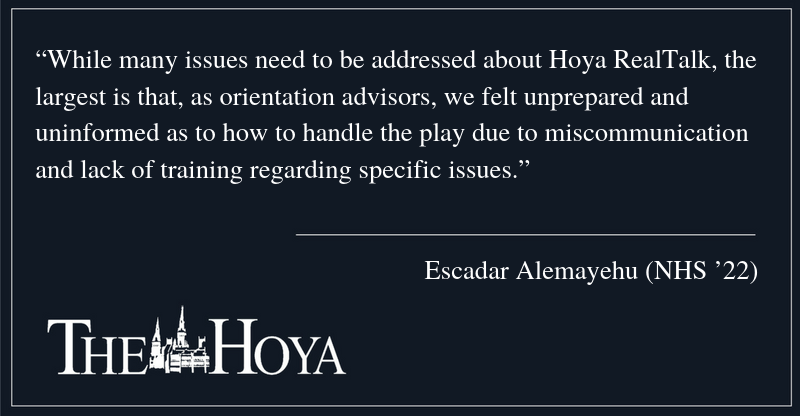Hoya RealTalk is a play put on by students, New Student Orientation and Health Education Services to highlight on-campus resources and portray common issues students might face during their first few weeks of school. From what I remember, my Hoya RealTalk experience as a new student was positive. I enjoyed the play. I felt it was cheesy but informative, and it was nice to see students openly addressing issues of homesickness and stress culture while reminding me of resources on Georgetown University’s campus.
This year, however, the play took a different turn. While many issues need to be addressed about the play, the largest is that, as Orientation Advisors, we felt unprepared and uninformed as to how to handle the play due to miscommunication and lack of training regarding specific issues.
First, OAs were not provided with any sexual assault response or prevention training. In fact, the only training we received from HES was doing stress management exercises such as mindfulness practices and deep breathing. These exercises were very helpful, but not in the context of what was addressed in the play. The New Student Orientation staff, including the OAs, also did not see the play before it was performed in front of the new students, which posed a grave problem for us. We were not expecting some of the content, we were not trained to answer certain questions and we did not know how to help our new students because we were experiencing it alongside them.
Furthermore, I Am Ready — a facilitated conversation that deals with sexual assault and problems surrouding it — was not in the NSO programming, even though the organizers of the play believed it was. There was a clear lack of communication and preparation for us as NSO staff to properly address the issues the play incorporated, like sexual assault, eating disorders, racial microaggressions, homophobic slurs and addiction.
None of these issues were covered in OA training, and we were not properly prepared to address them with our new students — yet they were still addressed in the play. I felt as if I was in a situation in which I could not properly answer the questions or give the right information that my new students needed.
The directors of the play did not give students a trigger warning prior to seeing it. The play itself tackled more serious issues than it did last year but could have approached these issues in a better way. There were references to income inequality in a nonchalant way. One character was using Juuls throughout the play, but there was no reference to the gravity of this issue. Rather, the play joked about it. When addressing stress culture, they mentioned how lack of sleep affects hormone levels. An actor responded in a condescending and mocking manner, saying, “Weight gain anyone?” This statement was shocking with its fat-phobic connotations. The play also used a homophobic slur in reference to a group of students harassing one another and didn’t address the punishment for that harassment or what actions the students being harassed could take. Lastly, the sexual assault matter depicted in the play ended with the aggressor confessing to an Alcoholics Anonymous group and the other characters coming up to the stage to forgive him. These characters even included the woman he assaulted. The play offered no instruction regarding what resources to turn to if a student enters the Title IX process for reporting sexual misconduct. The play also mentioned no consequences the aggressor would face, ending after the cast forgave him.
All this being said, NSO issued an apology to all the staff members after receiving numerous complaints about the play. This apology encompassed all the concerns I had, mainly about the lack of communication and preparation. HES had a feedback session a few weeks ago for NSO staff as well. As a staff member, I appreciated its ownership and response to criticism; I felt as if NSO heard our complaints and sincerely apologized. Six weeks have passed, and NSO has come and gone; however, all new students will experience issues like the ones addressed in the play during their time at Georgetown. Furthermore, all Georgetown students must have the tools, resources and information to properly confront these problems, and that is why it is still important to address this issue after NSO.
In the future, NSO and HES must work together to prepare the NSO staff. I received many questions I didn’t know how to answer. I felt overwhelmed after this play, so I can’t imagine how my new students must have been feeling. These conversations are important to have, but they require civility, preparation and sufficient knowledge in these issues. We should put our best foot forward as a community and address these issues in the most respectful way possible when welcoming new students. All of these things must be considered so a situation like this one doesn’t happen again.
Escadar Alemayehu is a sophomore in the School of Nursing and Health Studies.














